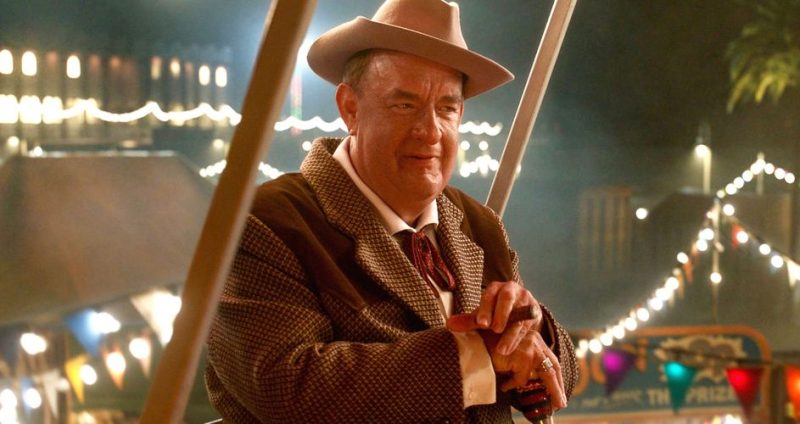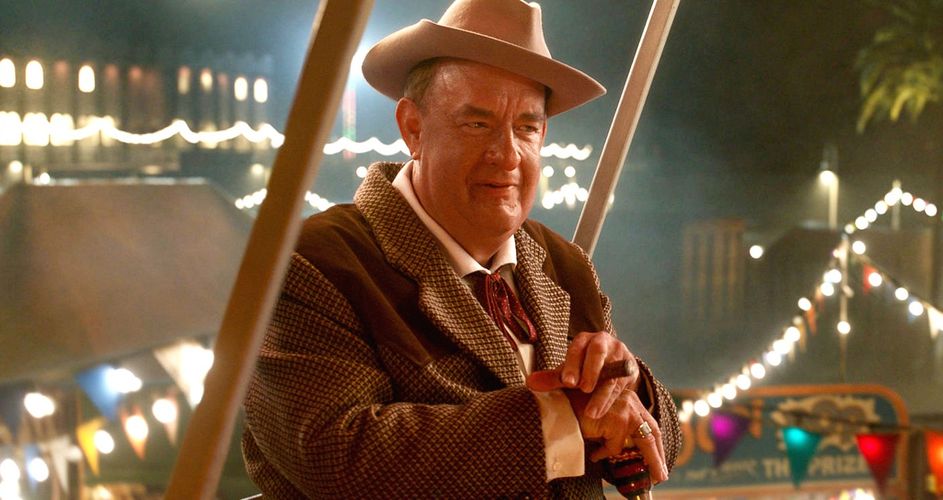
An unrealiable narrator tells a story that can’t be believed because the narrator has questionable credibility or motives. Similarly, an unreliable director presents a movie that satisfies some agenda while manipulating the audience through camera work, editing or twisting of the facts. With a larger-than-life figure like Elvis Presley, a filmmaker could try countless ways to tell his story. One of the worst ways to do that would be for an unreliable director to use an unrealiable narrator to introduce a version of Presley. Sadly, Baz Luhrmann’s biopic goes down a rabbit hole of inauthenticity as it moves from one vignette to another. Even worse, the focus shifts from the titular character to Presley’s longtime manager, Colonel Tom Parker, so much that the movie could have easily been called Parker. Elvis collapses under the weight of its director’s ambitions and style instead of letting its standout lead re-create more key moments in the icon’s life.
Luhrmann captured my interest nearly 30 years ago with Strictly Ballroom, a movie about dancing that employed his typical style of musical numbers, fancy editing and unusual camera techniques. Since then, my opinions of his movies have been mixed. I did not like Romeo + Juliet and Moulin Rouge! as much because Luhrmann overdid it with corny comedy and production numbers that didn’t fit the moment and distracted from the love stories at the core of each of those films. Australia bombed at the box office, yet the experience was more genuine and enjoyable than either of his two previous releases. Luhrmann nearly got everything exactly right with The Great Gatsby, which shows that you can’t ever count anyone out. As long as someone continues to make movies, there’s always a chance for another winner. (It’s hard at this point, but I still hope that M. Night Shyamalan reverses course from his line of mediocre and outright terrible films.) From the start, the concept for Elvis would have been scrapped if someone had just spoken up during a creative discussion or writing exercise.
A framing segment shows a dying Parker (Tom Hanks) reflecting on his life in which he both managed and promoted Presley (Austin Butler). A simple scene on a Ferris wheel has Parker asking Presley if he wants to become a star. Instead, that scene epitomizes what’s wrong with Elvis: it doesn’t ring true, the focus is on Parker and Parker comes off more like the devil himself tempting and using Presley rather than merely a sleazy loser of a man. It’s hard to pin down the plot because the film jumps all over the place as it tries to cram in over two decades of Presley’s life (and some childhood years) in 2 ½ hours. A miniseries would have provided the time necessary to do Presley justice. Luhrmann spends a lot of time on the creation of Presley’s 1968 television special while blasting through a few years in less than five minutes. Also, Lurhmann includes Presley’s entourage known as the Memphis Mafia, further taking away from Presley himself. Events get more interesting as Presley begins his run at the International Hotel in Las Vegas. At that point, it’s too late to truly pay attention because of the manipulative moments that preceded that time period. Only two things keep Elvis from being a complete disaster: the unforgettable songs and Butler’s performance.
As much as I disliked Elvis, I equally praise Butler for capturing Presley so well from a young, skinny kid to the bloated jumpsuit years. Butler must have studied film of Presley for many hours because he has the legend’s swagger and speech down pat without descending into impersonator territory. Moreover, Butler sings all of the early hits himself rather than the computer manipulation that I read about for the latter years in which the filmmakers digitally blend Butler’s and Presley’s voices. Luhrmann zooms in on Butler’s face and his eyes in particular so much that it’s practically hypnotizing. Many actors have stepped into The King’s shoes, and Butler ranks as one of the best. Hanks has often been called one of the best living actors, and he has the résumé to prove it. Nevertheless, his portrayal of Parker is completely wrong. Hanks uses an accent that doesn’t work, and the terrible fat suit turns him into Forrest Lump. I realize that the participation of Hanks probably got Elvis made, but I’d rather have no film than this pitiful character. Aren’t there enough plus-size actors available to play Parker? Olivia DeJonge as Priscilla Presley blends into the background as window dressing and only has two key scenes — kissing Presley for the first time and leaving him. In a movie about Parker, there’s hardly any room for her.
I didn’t and won’t fact-check Elvis for accuracy. I think that I already know the results. You can mix together or add events to present a history that’s close to the truth. If you try too hard as in that Ferris wheel scene, you risk losing the audience altogether. A scene with Presley’s electrifying performance in a pink suit typified how Luhrmann lost me. An audience member mocks Presley by calling him a “fairy,” yet that word is changed to “buttercup” in the trailer. If you felt uncomfortable using that word, maybe it didn’t belong to begin with. Anyway, the takeaway from that scene is that Presley made waves and caused controversy with his hip gyrations and movements while singing. Rather than just state that or show authorities’ reactions, Luhrmann zooms in on the faces of several women screaming maniacally and staring at Presley’s crotch as if they were at a Chippendales show. Similar scenes lacking authenticity pepper the running time. Did Parker truly jot a contract onto the proverbial cocktail napkin? Did a young Presley have a seemingly religious experience as he peered into a shack to watch a man perform the blues? Did Presley take so many pills that the countless bottles filled an entire wall? These and others make great scenes without a hint of truthfulness. Hey, at least you see Presley shoot out some televisions.
Luhrmann’s split screens and montages fit in some cases because the music truly should receive the most attention along with Presley. A brilliant moment reminds the audience of how important “That’s All Right” was to Presley’s success with simultaneous performances of the song. Had Luhrmann applied that creativity to the rest of the film without his editorializing and outright staged, phony moments, Elvis would have entertained me as much as the finale. Presley had so many hits that it’s impossible to include some without overlooking others that fans would want to hear. What Luhrmann does fit into the movie pleasantly reminded me of Presley’s musical prowess, which strongly overshadowed his acting career. The Vegas production numbers generate the most fun, and “Unchained Melody” takes your breath away, especially because Luhrmann obtained the rights to use the actual footage of Presley. Check out the soundtrack for a variety of artists interpreting some iconic songs.
After seeing the trailer, I was worried that Luhrmann would detract from his lead character with his treatment of Parker. Although that exactly happened, I hope that Luhrmann has another experience up his sleeve like The Great Gatsby. A lot of bling adorns the Warner Bros. logo as well as the movie title, and all of that flash belies the sometimes boring show underneath. Even in death, Presley outshines most musical stars both alive and dead. For that reason, I’d sooner watch concert footage of the actual Presley than this biopic imitator called Elvis that merely shares his name.



